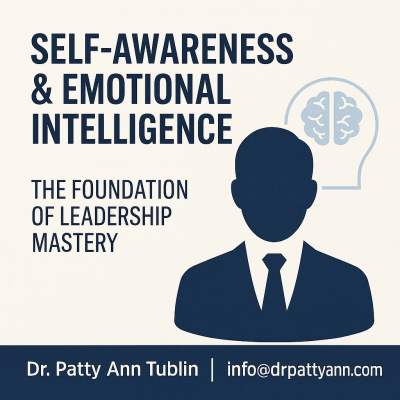
Self-Awareness & Emotional Intelligence: The Foundation of Leadership Mastery
Think back to the best leader you’ve ever worked with. Chances are, it wasn’t their technical knowledge or sharp business acumen that stood out — it was how they carried themselves, how they made you feel heard, and how they handled pressure with calm clarity.
That quality didn’t come from a textbook. It came from self-awareness, the cornerstone of emotional intelligence (EQ).
What Self-Awareness Really Means
Self-awareness is about more than just “knowing yourself.” It’s recognizing how your thoughts, emotions, and actions ripple outward to impact the people around you.
- On the inside, it’s about understanding your values, motivations, and emotional triggers.
- On the outside, it’s about realizing how others actually experience you — which doesn’t always match your intention.
The best leaders don’t stop at knowing what drives them; they also pay attention to how their presence shapes the room.
Why It Matters So Much in Business
Leadership without self-awareness is like driving without a map — you might be moving fast, but you’re not in control of where you’re headed.
Here’s what self-awareness makes possible:
- Smarter decisions – You recognize biases before they trip you up.
- Healthier relationships –You manage your emotions instead of letting them spill over (and manage you).
- Resilience in tough times – You can spot stress signals before they escalate.
- Authenticity – People trust leaders who are genuine, not those who pretend to be perfect.
How It Connects to Emotional Intelligence
Emotional intelligence has five core components: self-awareness, self-regulation, motivation, empathy, and social skills.
Self-awareness comes first for a reason. If you don’t understand yourself, you can’t regulate your emotions, genuinely empathize with others, or inspire people to follow your lead
Practical Ways to Strengthen Self-Awareness
The good news? Self-awareness isn’t fixed — it can be developed. A few simple practices go a long way:
- Ask for feedback. A trusted colleague’s honest perspective can reveal blind spots.
- Pause before reacting. Even a few seconds of reflection can shift the outcome of a conversation.
- Notice your “hot buttons.” Pay attention to what triggers strong emotions, then choose how to respond.
- Try mindfulness. Breathing or grounding exercises can help you stay present in the moment.
- Journal your leadership moments. Writing down challenges and emotional reactions will reveal patterns over time.
Final Thoughts
Great leadership doesn’t start with strategy, spreadsheets, or speeches. It starts with self-awareness — the ability to look inward with honesty and lead outward with intention.
When you develop this skill, you lay the foundation for emotional intelligence, and with it, the capacity to inspire, influence, and truly lead.
